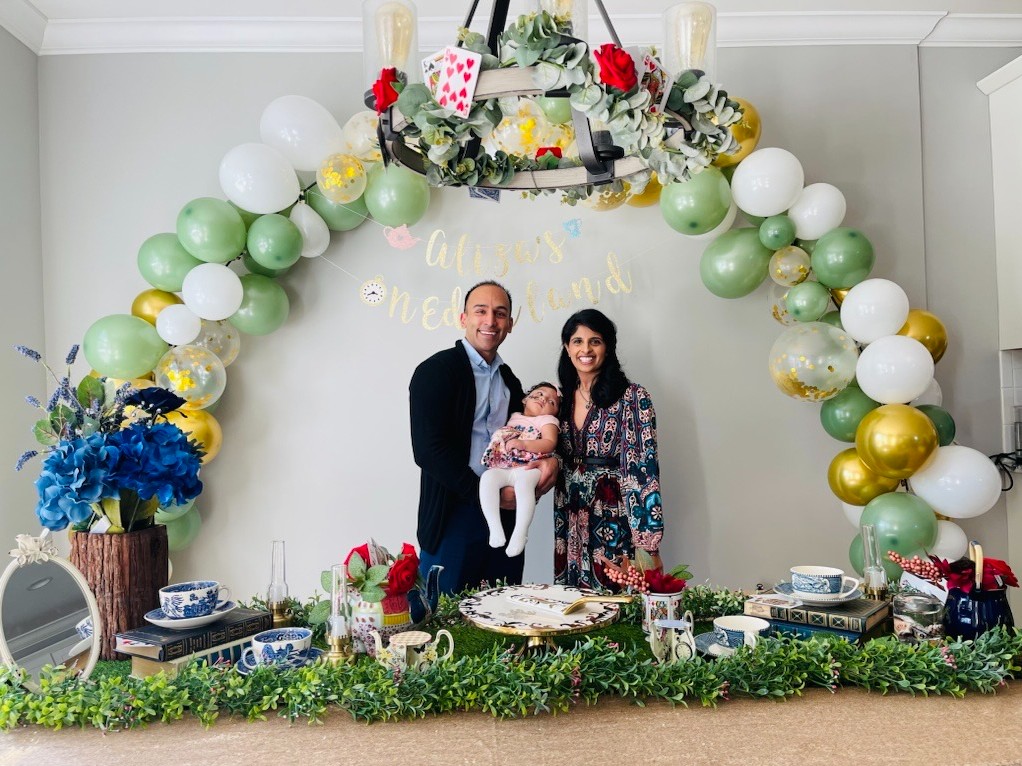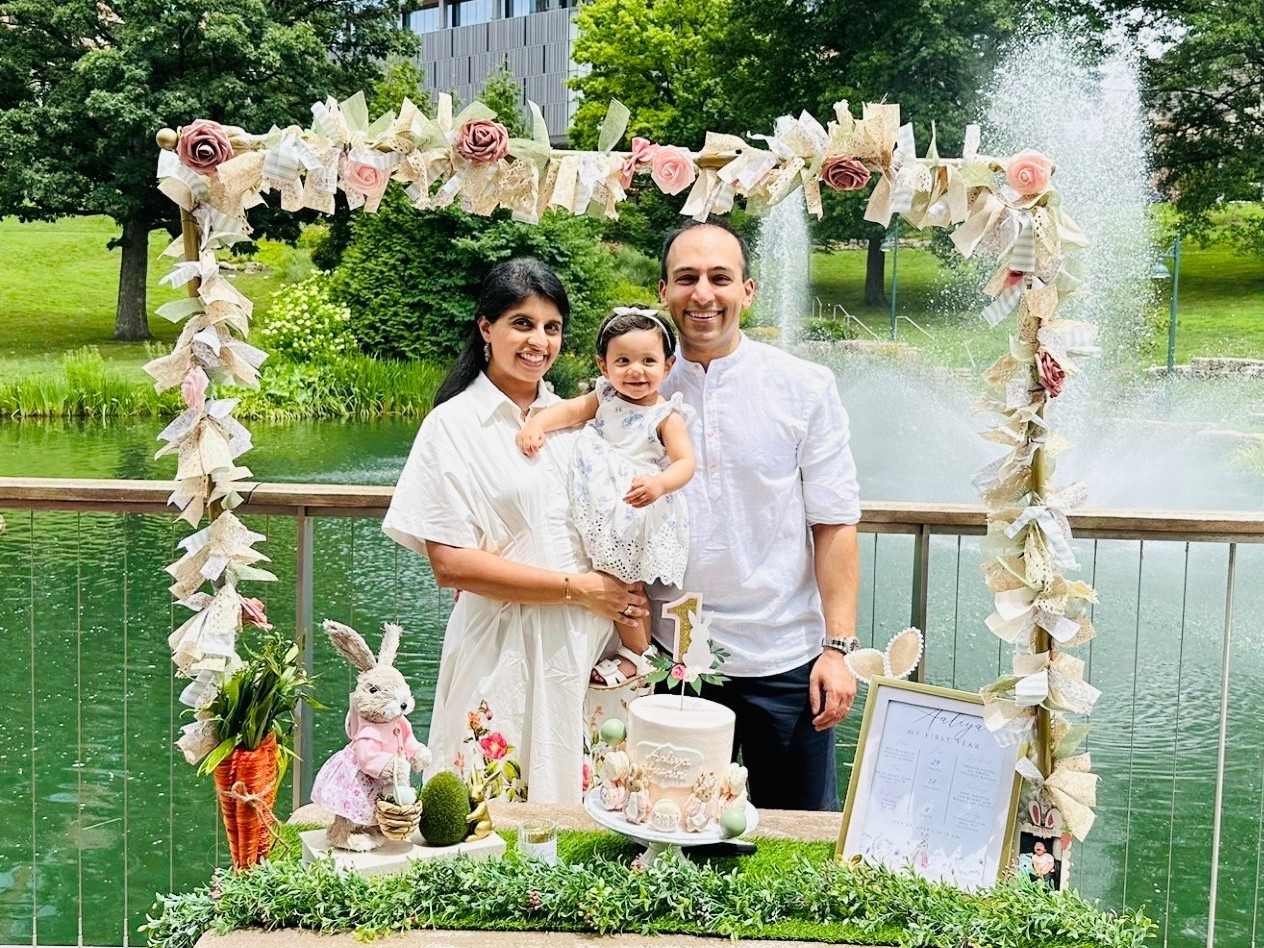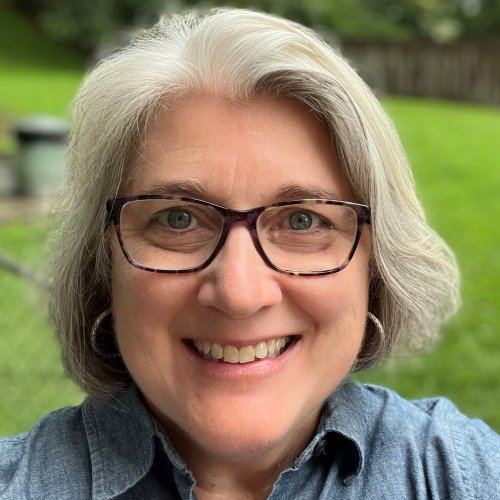An EMBA family’s loss inspires leadership curriculum for WashU Medicine fellows
- September 15, 2025
- By Suzanne Koziatek
- 5 minute read

As Mustafa Husaini embarked on his Executive MBA journey in 2021, he and his wife Fawzia also began another journey — becoming parents and then losing their infant daughter, Aliza, to a rare disorder.
During those difficult and uncertain months, Mustafa and Fawzia leaned heavily on their support system, which included Mustafa’s new Olin classmates in the EMBA program. That experience — both the terrible loss and the unexpected gift of friendship and camaraderie — led the couple to look for ways to bring hope out of their grief.
Mustafa, then a cardiologist at WashU Medicine, put together a leadership curriculum for cardiology fellows at the school. It was informed by his EMBA training, but also by his and Fawzia’s experiences navigating the healthcare system as they tried to help their daughter.
That leadership curriculum is now named for Aliza. It’s trained medical fellows across WashU School of Medicine and Mustafa is working to replicate it at other institutions.
The couple are now on the East Coast, having recently moved for Fawzia’s career. They’re focused on the lessons they’ve learned from the last four years: being “better, not bitter” about the difficulties they’ve endured, and the power of sharing personal stories to provide both education and connection.
“We wanted to share our story because we think there's so many positive impacts on other people,” Mustafa said. “And there’s so much written both in the MBA world and in healthcare about how storytelling is such a good avenue to learn these principles.”
A healthcare odyssey
The Husainis’ EMBA experience and life with Aliza were almost precisely aligned. “We found out we were pregnant a week after I got accepted into the MBA program,” Mustafa said. “We were due during GO Week.”
Fawzia recalled that their first outing without Aliza was to a Friendsgiving celebration thrown by Mustafa’s EMBA colleagues and their spouses. “They welcomed us with gifts for Aliza, and they were saying, ‘It’s going to be great — we're all moms, we’ve all been through it.’ I remember what great support they were.”
Aliza started to experience problems, and was hospitalized for failure to thrive. Doctors initially diagnosed severe colic, but eventually came to a different conclusion: leukodystrophy, a rare, incurable genetic condition.
Mustafa said that as he was learning about values-based decision-making in business, he was watching it play out in real time during what he called their “healthcare odyssey.”
Aliza died just months before Mustafa’s graduation. “And so we went through that entire journey — giving birth, going through the diagnosis, going through the pain, and burying our child — while he was in the EMBA program,” Fawzia said.
Mustafa’s cohort walked alongside them throughout. “The relationships he had formed with some of the people who were doing the MBA program, they became our lifelong friends,” Fawzia said. “They became our support system.”
At graduation, class speaker Peter Richardson alluded to the pain the cohort shared, his voice breaking: “We’ve seen a classmate and his wife persevere through the most unimaginable grief that a family can endure, and we’ve been inspired by their perseverance, their perspective, and their love through it all.”
'Better, not bitter’
The Husainis’ experience with Aliza’s care gave them a unique window into the bureaucratic challenges of providing healthcare. Based on that experience, Mustafa decided to create a curriculum for the cardiology fellows he worked with, to discuss ways that medical professionals can lead with purpose and improve the systems around them.
One principle Mustafa incorporated into this curriculum was his wife’s insistence that they should “be better, not bitter” after learning about Aliza’s diagnosis. “I realized that I could spend the rest of these months or years that we have with her being bitter about the situation, or realizing what we had,” Fawzia said. “I could have been a single mom navigating this by myself, but I had him. We were educated enough to navigate the healthcare system. Through his MBA, we built a network that supported us and helped us.”
One incident stood out as an example: While the medical team searched for a diagnosis, Aliza was in the hospital over a weekend and needed a test that required her to refrain from taking anything by mouth. After several hours with no feedings, the staff decided to cancel the test because it was a weekend and not considered to be an emergency.
Fawzia didn’t want to put her daughter — already struggling to keep on weight — through another round of waiting. She appealed to Mustafa to find a solution.
“And something sparked with him, and he went, ‘There is somebody’ — someone who was part of the (EMBA) program whom he had built a friendship with. He explained the situation, and that person said, ‘Hey, we'll help you. We'll get it scheduled.’”
Mustafa includes stories like this one to medical leaders as part of the curriculum.
“We use that case as a discussion point: You're a physician, you're the family. You're the hospital administrator. This is what the evidence says. And we have to optimize the revenue, optimize the timing,” he said. “Physicians are trying to do what's right within this system, trying to answer to the hospital's rules and regulations while trying to make sure the family is taken care of.”
He said stories like theirs drive home the main points of his curriculum: better communication, resolving conflicts, developing a sense of purpose, and promoting a culture of emotionally intelligent leadership. Mustafa said he took some inspiration from his MBA, but also from Olin’s executive education format.
He initially offered the curriculum in four two-hour sessions to cardiology fellows. “After the first few, word got out, and then our department of medicine said, ‘Our new fellows have orientation in July. Can you do a one-hour session for them? So, for the past two years, we've done a ‘light’ version with them.”
With his departure from St. Louis, he said the Aliza Husaini Memorial Leadership Curriculum will continue under the leadership of Prashanth Thakker, the cardiology fellowship program director. Meanwhile, as chair of the cardiovascular management section of the American College of Cardiology, Mustafa is in discussions about ways to scale this curriculum to other institutions. “It’s one of those things we're excited about that the future holds.”
While he could have chosen to discontinue his EMBA education to deal with Aliza’s illness, both Mustafa and Fawzia are grateful that they decided to stick with it, thanks in part to the community they created with his EMBA classmates. In addition to grieving with them, they now share in the joy of the Husainis’ 1½-year-old daughter Aaliya.
Fawzia said that the closeness they developed with the cohort helped her understand the necessity of the time Mustafa put into studies and team meetings. “I knew he had to be present because he was doing it for his team and his group. it's not a one-person thing to show up at an MBA.”
Both believe that MBA students and their families should understand the importance of investing time in building relationships within their cohort to get the most out of the experience.
“It’s part of the whole package — the financial ROI, the intellectual ROI, and the life ROI,” Mustafa said.
A path forward
The Husainis are now the parents of 1½-year-old Aaliya.

Media inquiries
For assistance with media inquiries and to find faculty experts, please contact Washington University Marketing & Communications.
Monday–Friday, 8:30 to 5 p.m.
Sara Savat
Senior News Director, Business and Social Sciences
